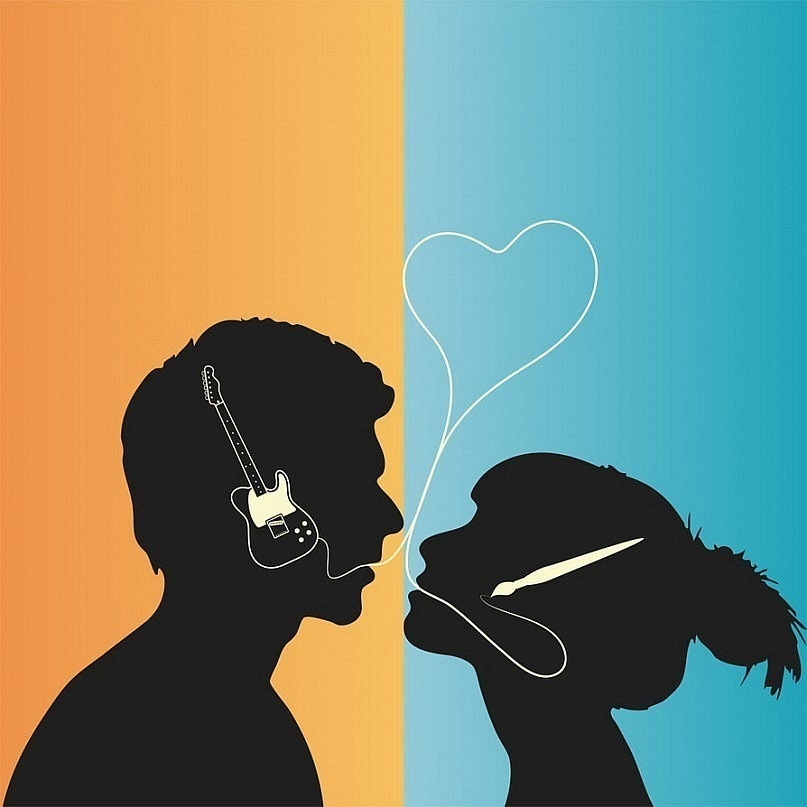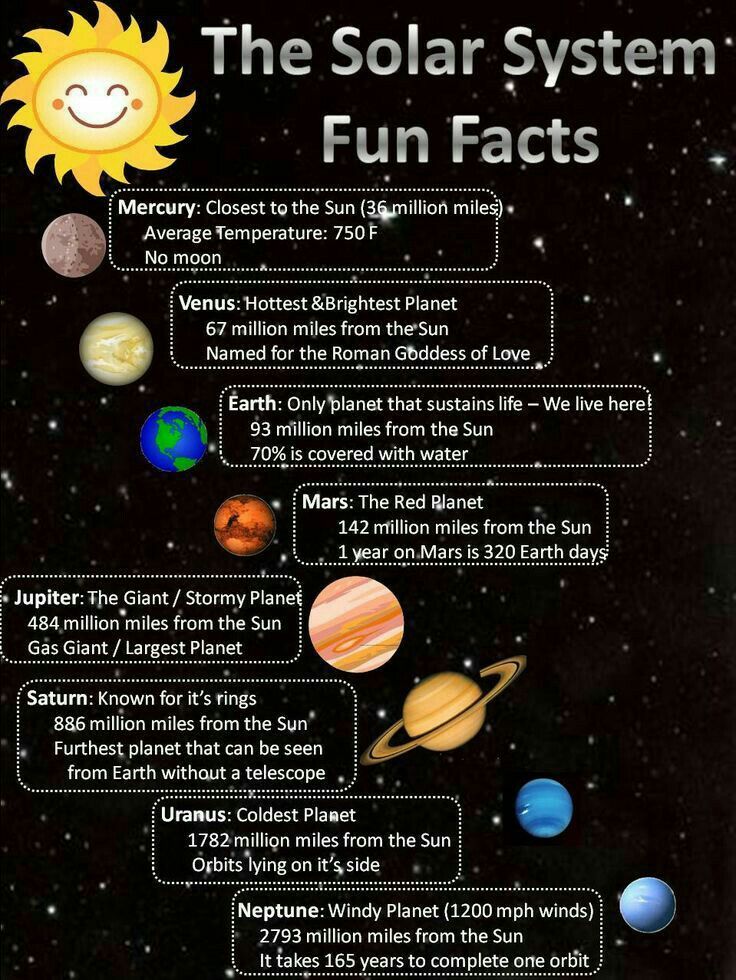Connection to music
How Music Connects Us To Each Other
Every culture in the world has their own form of music. It is an ancient art form that has always existed alongside people. In fact, some scientists even think that it allowed our ancestors to communicate before the invention of language. So how does it continue to connect us to each other?
Humans were made for music
Humans have a special part in our brain dedicated to processing music. Our brains are specifically attuned to hear music over other environmental sounds, much like they’re attuned to speech. This suggests that music must have an important function in our lives
Music makes us feel good
When we listen to and play music, our body releases dopamine and endorphins. These are “happy” hormones involved in regulating moods. Music literally makes us feel good.
This is especially so when we make music together. Researchers found that performing music in a group was even better. Singing, drumming, and dancing all resulted in more ‘happy hormones’ in people’s brains. Therefore, performing music together makes us feel better than when we perform alone.
Music allows us to celebrate
We often hear music at celebrations. It is a way to express joy and have fun. This joy is often also expressed through dancing. Dancing to music allows people to show how they feel through movement. By celebrating together through music, people create lasting bonds.
Music creates a group identity
Scientists think that when people listen to music together, something special happens in their brains. The scientists believe that listening to music in a group helps people to connect. This connection happens because the rhythm in the music helps people’s brains to synchronise. This helps them to coordinate their body movements . As a result, music can influence how we work in a group.
For example, people who listened to rhythmic music together finish tasks more efficiently than people who listened to the other types of sound. This suggests that rhythm in music promotes behaviors that are linked to social cohesion, such as teamwork.
This suggests that rhythm in music promotes behaviors that are linked to social cohesion, such as teamwork.
Music allows us to express ourselves
Not all music utilises words, but all music has the capacity to share how we feel. People who make music are able to use music to express themselves. However, it is not just people making music who benefit. People listening can often empathise with the music they listen to. That means that even through passive listening people can connect.
When a culture shares a particular type of music, this can create a sense of togetherness. This is because as emotions are shared and received, they become part of a collective experience.
Conclusion
The inclusive nature of music allows us all to take part, even through passive listening, in a communal form of art. Music connects us because it is universal. No matter where you are the world, taking part in a musical activity with others is sure to bring a smile to your face.
Music and the Soul – Why Do People Like Music?
Music, because of its deep connections with the brain, is intrinsically meaningful to humanity as a race. We thrive off it. It drives our actions and emotions, and its influence on our brains creates a sense of unity with music that few other art forms can provide.
In a field known as the “Psychology of Music,” psychologists have been studying music’s meaning in our culture and our emotions. The Psychology of Music is still a very vague topic, with much studying left to do on it, but it is emerging as one of the top subfields of psychology. (Tan)
We, as human beings, have something called a “musical memory,” and all of ours are pretty good. Some are better than others, but most of us have the ability to remember how a song goes and are able to sing along with our favorites. An example of an outstanding musical memory is Italian conductor Arturo Toscanini. There are rumors that he knew, by heart, every note of over 250 symphonies, 100 operas, and several volumes of instrumental compositions.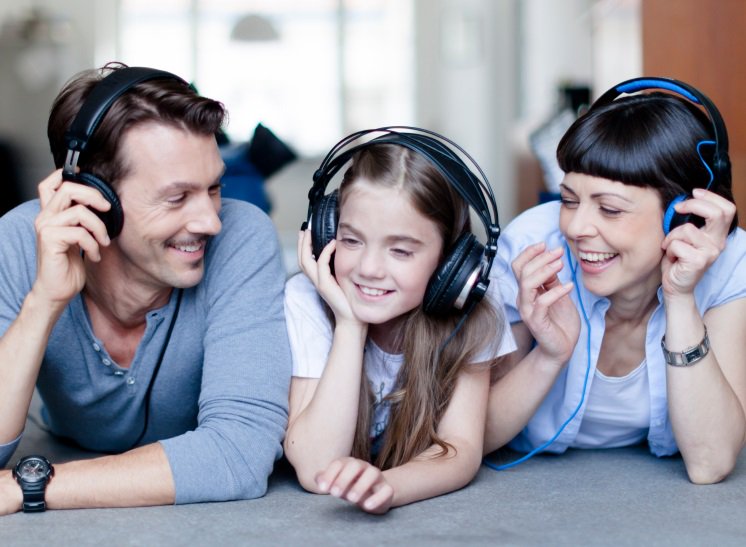 (Williamson) Memory is not restricted to music, of course, as many people have good memories for certain subjects, and are unable to remember facts about topics that don’t interest them. Memory takes practice, and that goes for musical memory as well. Musicians like Toscanini practice for hours upon hours, developing their musical minds. Musical memory also stays in the brain for a very long time. There are many cases of dementia, Alzheimer’s, or head injury patients who, despite losing recollection of other things, can still remember music. (Williamson)
(Williamson) Memory is not restricted to music, of course, as many people have good memories for certain subjects, and are unable to remember facts about topics that don’t interest them. Memory takes practice, and that goes for musical memory as well. Musicians like Toscanini practice for hours upon hours, developing their musical minds. Musical memory also stays in the brain for a very long time. There are many cases of dementia, Alzheimer’s, or head injury patients who, despite losing recollection of other things, can still remember music. (Williamson)
-Toscanini
Another interesting phenomenon in music is known popularly as the “earworm,” in which a person gets a song “stuck in his/her head.” There is no known cause for the earworm, no reason for the song to be stuck in one’s head. It just is. Earworms are interesting in the way that they are almost an itch that can be scratched by listening to the song in question, or by singing it out loud. The catchiness of a song is also something that can’t be measured scientifically.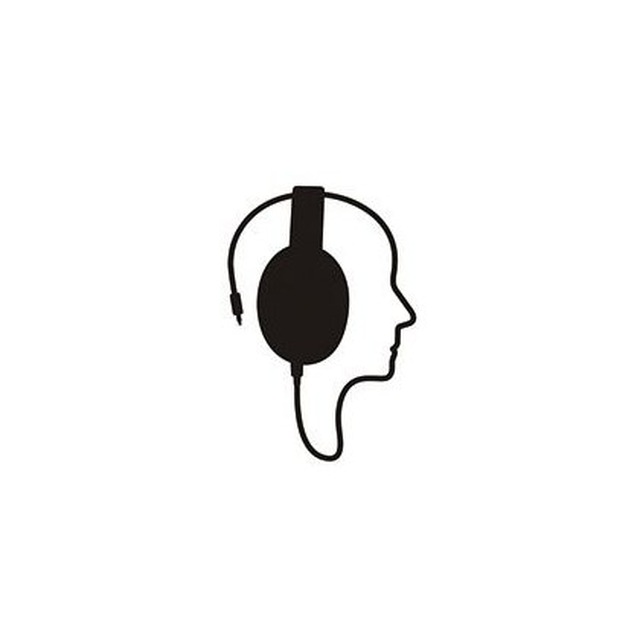 It is thought to replay in our heads under the right circumstances: the right song, at the right time. (Williamson) We also find that the more musically trained a person is, the more beautiful music sounds to him/her. People can, in fact, teach themselves how to listen to music. Researchers took 19 non-musicians and taught them several chords. After a few sessions of learning these chords, the participants found the chords to be more pleasurable to listen to than before, and they continued to hear unfamiliar chords as unpleasant. (Abrams) This supports the fact that the music of different cultures around the world doesn’t necessarily sound the same to everyone. Western music sounds beautiful to the ears of people who grew up listening to it in western nations. While those western people might not enjoy the musical sounds of the Middle East or the Caribbean, people from those places who grew up with those types of music, would. (Abrams)
It is thought to replay in our heads under the right circumstances: the right song, at the right time. (Williamson) We also find that the more musically trained a person is, the more beautiful music sounds to him/her. People can, in fact, teach themselves how to listen to music. Researchers took 19 non-musicians and taught them several chords. After a few sessions of learning these chords, the participants found the chords to be more pleasurable to listen to than before, and they continued to hear unfamiliar chords as unpleasant. (Abrams) This supports the fact that the music of different cultures around the world doesn’t necessarily sound the same to everyone. Western music sounds beautiful to the ears of people who grew up listening to it in western nations. While those western people might not enjoy the musical sounds of the Middle East or the Caribbean, people from those places who grew up with those types of music, would. (Abrams)
With music’s deep connection to the limbic system, people tend to find connections in music through memories.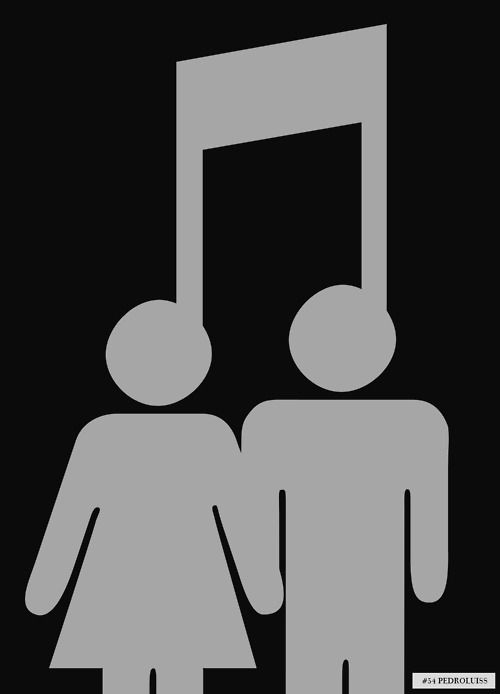 Certain songs have a way of taking you to certain time or a specific place in your life. Because of this, we feel a reminiscent connection to music to go along with the emotions it already arouses in us. Music also has a connection with the brain’s pleasure and reward center, which is responsible for the sensation we call “chills down the spine.” Chills give us an unparalleled feeling, which is caused by a “wanting” and “liking” of the music. The tension and resolution involved with music causes us to want the music to resolve, and when it does, can give us such a sensation.
Certain songs have a way of taking you to certain time or a specific place in your life. Because of this, we feel a reminiscent connection to music to go along with the emotions it already arouses in us. Music also has a connection with the brain’s pleasure and reward center, which is responsible for the sensation we call “chills down the spine.” Chills give us an unparalleled feeling, which is caused by a “wanting” and “liking” of the music. The tension and resolution involved with music causes us to want the music to resolve, and when it does, can give us such a sensation.
A question that has arisen, however, is whether reactions to music are universal, or cultural. While we know a person can learn to listen to a certain type of music, at its basic level, what drives our love for the music we love? The response can never be one reason wholly over the other. They both affect us. Certain chords are pretty in certain cultures, and growing up in that culture, you learn that you should feel a certain way while hearing that music. However, we all have the same ear and brain structure, which would lead us to believe that our reactions to specific types of music should at least be similar to one another’s. (Williamson) In a study done using participants from separate cultures (India, Japan, and Sweden) listeners were given 11 emotions to identify in 132 musical examples. Each participant also rated his/her familiarity with the cultural identity of the music. At the end of the study, the people of different cultures had shown similar, but still varying views on the emotions conveyed by the music. Some cultures even had a predisposition to specific feelings, rating those emotions more often than others. (Williamson)
However, we all have the same ear and brain structure, which would lead us to believe that our reactions to specific types of music should at least be similar to one another’s. (Williamson) In a study done using participants from separate cultures (India, Japan, and Sweden) listeners were given 11 emotions to identify in 132 musical examples. Each participant also rated his/her familiarity with the cultural identity of the music. At the end of the study, the people of different cultures had shown similar, but still varying views on the emotions conveyed by the music. Some cultures even had a predisposition to specific feelings, rating those emotions more often than others. (Williamson)
We are beginning to understand our own love of music not only as a cognitive reflex, but as a true art form. This view is called the “Neuroaesthetics of Music.” (Brattico 48) The goal of this emerging field is to understand the basics of music perception, cognition, and emotion. (Brattico 49)
(Brattico 49)
Of course, in the field of psychology, there are no absolute answers, but the study of music psychology continues to grow. Hopefully we will come to understand more about this field in the future, but for now, we will continue searching for answers to the intriguing questions this topic gives us.
Scientists have uncovered the connection between music, mathematics and good studies - RIA Novosti, 06/24/2019
Scientists have revealed the connection between music, mathematics and good studies
Schoolchildren studying in music schools are noticeably better at math or language exams and tests than other peers. About this ... RIA Novosti, 06/24/2019
2019-06-24T16: 59
2019-06-24T16: 59
2019-06-24T16: 59
Science
Education-
Education
USA
Oidfields-RIA Science
Sociology
math
music
/html/head/meta[@name='og:title']/@content
/html/head/meta[@name='og:description']/@content
https://cdnn21. img.ria.ru/images/101145/84/1011458473_0:263:3112:2013_1920x0_80_0_0_74b62d5891d71029d61443eff2bdfbfc.jpg
img.ria.ru/images/101145/84/1011458473_0:263:3112:2013_1920x0_80_0_0_74b62d5891d71029d61443eff2bdfbfc.jpg
MOSCOW, June 24 - RIA Novosti. Schoolchildren studying in music schools are noticeably better at math or language exams and tests than other peers. This is written by scientists who published the results of large-scale observations of high school students in the Journal of Educational Psychology. In recent years, scientists have been actively trying to understand whether many human abilities, including musical talents, a penchant for mathematics and science, writing skills and other distinctive features are heritable from a genetic point of view. Psychologists, geneticists and neurophysiologists have conducted dozens and hundreds of experiments, the results of which turned out to be extremely heterogeneous, which led many scientists to conclude that such "genetic" relationships do not exist. On the other hand, a recent comparison of the mathematical abilities of parents and their children showed that abilities are more likely to be inherited than not, but much depends on upbringing and education. At the same time, many ordinary people and researchers often notice that children who are capable of music also perform well in mathematics, and vice versa. This makes scientists even more arguing about what exactly is associated with academic success, how random the relationship between the love of numbers and art is, and whether there are other patterns of this kind. Guzuasis and his colleagues decided to check whether this relationship really exists. To do this, they tracked the success of a record-breaking group of students in Canadian schools, which included over 100,000 high school students who had recently passed their final or intermediate exams. Analyzing this data, the scientists divided the children into two large groups - those who studied music, whose number was about 13%, and other schoolchildren who did not have such a hobby. In addition, sociologists compared the students of music schools among themselves, depending on what they studied and what successes they achieved.
At the same time, many ordinary people and researchers often notice that children who are capable of music also perform well in mathematics, and vice versa. This makes scientists even more arguing about what exactly is associated with academic success, how random the relationship between the love of numbers and art is, and whether there are other patterns of this kind. Guzuasis and his colleagues decided to check whether this relationship really exists. To do this, they tracked the success of a record-breaking group of students in Canadian schools, which included over 100,000 high school students who had recently passed their final or intermediate exams. Analyzing this data, the scientists divided the children into two large groups - those who studied music, whose number was about 13%, and other schoolchildren who did not have such a hobby. In addition, sociologists compared the students of music schools among themselves, depending on what they studied and what successes they achieved. These observations brought a lot of interesting and unexpected discoveries. First, Canadian researchers found that music influenced not only the mathematical success of schoolchildren, but also their performance in physics, biology, and the humanities. At the same time, interestingly, different types of creativity affected the performance of high school students in different ways. Children who learned to play any musical instrument in groups or orchestras performed better on average in exams than would-be singers and other representatives of vocal music. Similarly, the higher the success in a particular area of music, the brighter they manifested themselves in mathematics, languages and natural sciences.
These observations brought a lot of interesting and unexpected discoveries. First, Canadian researchers found that music influenced not only the mathematical success of schoolchildren, but also their performance in physics, biology, and the humanities. At the same time, interestingly, different types of creativity affected the performance of high school students in different ways. Children who learned to play any musical instrument in groups or orchestras performed better on average in exams than would-be singers and other representatives of vocal music. Similarly, the higher the success in a particular area of music, the brighter they manifested themselves in mathematics, languages and natural sciences.
https://ria.ru/20160713/1465407674.html
https://ria.ru/20160902/1475929080.html
USA
RIA Novosti
1
9000 9000 96 96 9000 9000 9000 9000 9000 9000 9000 9000 9000 9000 9000 9000 9000 9000 9000 9000 9000 9000 9000 9000 9000 9000 9000 9000 9000 9000 9000 9000 9000 9000 9000 9000 9000 9000 9000 9000 9000 9000 9000 9000 9000 9000 9000 9000 9000 9000 9000 9000 9000 9000 9000 9000 9000 9000 9000 9000 9000 9000 9000 9000 9000 9000 9000 9000 9000 9000 9000 9000
internet-group@rian.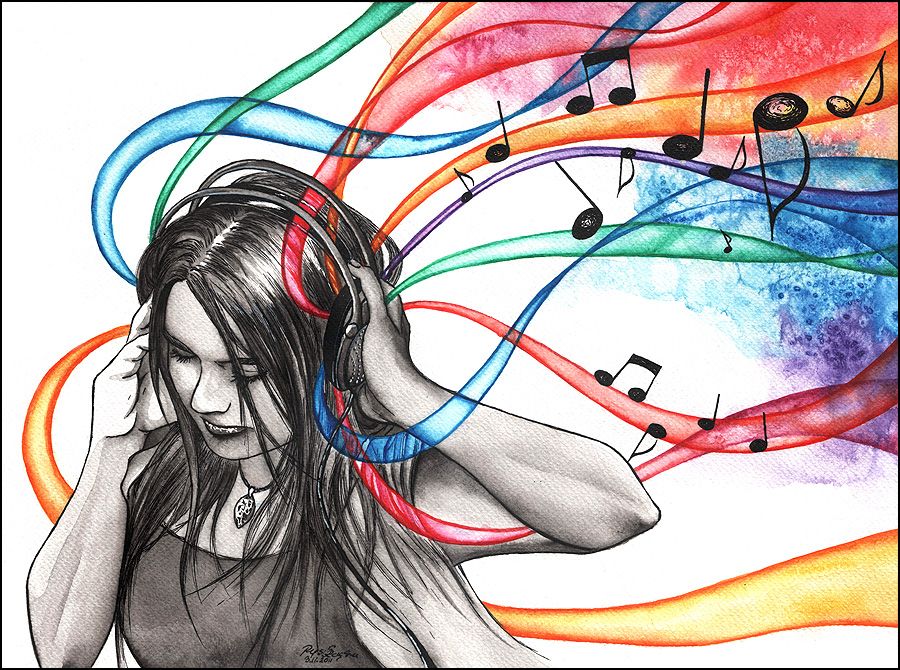 ru
ru
7 495 645-6601
Rossiya Segodnya
https://xn--c1acbl2abdlkab1og.xn--p1ai/awards/
2019
RIA News 1
5
4.7
96
7 495 645-6601
Rossiya Segodnya
https://xn--c1acbl2abdlkab1og.xn--p1ai/awards/
https://ria.ru/docs/about/copyright.html
https://xn--c1acbl2abdlkab1og.xn--p1ai/
RIA Novosti
1
5
4.7 900 023 [email protected]
7 495 645-6601
Rossiya Segodnya 95 645-6601
Federal State Unitary Enterprise MIA Russia Today
https: //xn---C1acbl2abdlkab1og.xn--p1ai/Awards/
RIA Novosti
1
5
4.7 9000 9000
Internet- [email protected]
7 495 645-6601
Rossiya Segodnya
https://xn--c1acbl2abdlkab1og.xn--p1ai/awards/
ria science, sociology, mathematics, music
Science, Education - Society, Education, USA, Discoveries - RIA Science, sociology, mathematics, Music
MOSCOW, June 24 - RIA Novosti.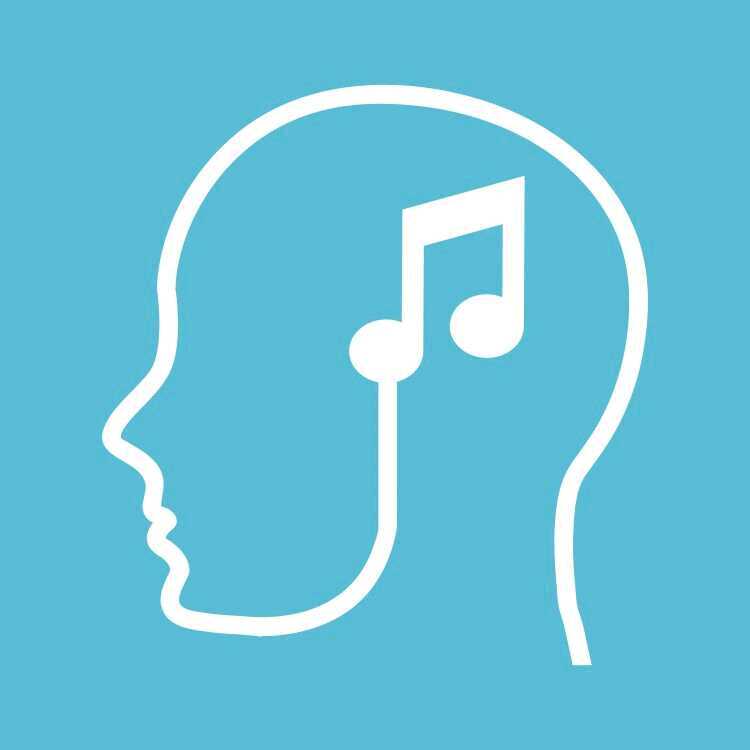 Schoolchildren studying in music schools do noticeably better in math or language exams and tests than other peers. This is written by scientists who published the results of large-scale observations of high school students in the Journal of Educational Psychology.
Schoolchildren studying in music schools do noticeably better in math or language exams and tests than other peers. This is written by scientists who published the results of large-scale observations of high school students in the Journal of Educational Psychology.
"Music and arts classes are often relegated to the background and funded on a residual basis, as officials believe they interfere with children's learning of math, science and language. We have shown that this is not the case - the more children were involved in music, the better they studied,” says Peter Gouzouasis from the University of British Columbia (Canada).
In recent years, scientists have been actively trying to understand whether many human abilities, including musical talents, aptitude for mathematics and science, writing skills and other distinguishing features are inherited from a genetic point of view.
Psychologists, geneticists and neurophysiologists have conducted dozens and hundreds of experiments, the results of which turned out to be extremely heterogeneous, which led many scientists to conclude that such "genetic" relationships do not exist.
On the other hand, a recent comparison of the mathematical abilities of parents and their children showed that abilities are more likely to be inherited than not, but much depends on upbringing and education.
July 13, 2016, 20:03 Science "correct" melodies.
At the same time, many ordinary people and researchers often notice that children who are capable of music, at the same time show themselves well in mathematics, and vice versa. This leads scientists to argue even more about what exactly is associated with academic success, how random the relationship between the love of numbers and art is, and whether there are other patterns of this kind.
Guzuasis and his colleagues decided to test whether this relationship really exists. To do this, they tracked the progress of a record-breaking group of students in Canadian schools, which included more than 100,000 high school students who had recently passed their final or midterm exams.
Analyzing these data, scientists divided the children into two large groups - those who studied music, whose number was about 13%, and the rest of the schoolchildren who did not have such a hobby. In addition, sociologists compared students of music schools with each other, depending on what they studied and what successes they achieved.
In addition, sociologists compared students of music schools with each other, depending on what they studied and what successes they achieved.
These observations brought a lot of interesting and unexpected discoveries. First, Canadian researchers found that music influenced not only the mathematical success of schoolchildren, but also their performance in physics, biology, and the humanities.
At the same time, interestingly, different types of creativity influenced the performance of high school students in different ways. Children who learned to play any musical instrument in groups or orchestras performed better on average in exams than would-be singers and other representatives of vocal music. Similarly, the higher the success in a particular area of music, the brighter they manifested themselves in mathematics, languages and natural sciences.
"On average, children who learned to play an instrument in an orchestra or in a group were about a year ahead of their peers in terms of their knowledge and skills in all disciplines. Most likely, the need to understand notes, play well in a team and be able to very finely manage with his own hands plays an important role in the accelerated self-development of these children," Guzuasis concludes.
September 2, 2016, 04:14 PM
What is music
MUSIC (from Greek musike, letters. — art music), an art form, wherein means embodiment of artistic images serve certain way organized musical sounds. Main elements and expressive funds music - fret, rhythm, meter, pace, loud dynamics, timbre, melody, harmony, polyphony, instrumentation. Music fixed in music records and implemented in the process execution. Accepted division music on secular and spiritual. Main region sacred music - cult (oldest from the surviving now - music Buddhist ritual). FROM European iconic music (commonly called church) related European musical theories note writing, musical pedagogy. By performing funds music subdivided for vocal (singing), instrumental and vocal and instrumental. Music often fit with choreography, theatrical art, cinema. Distinguish music monophonic (monody) and polyphonic (homophony, polyphony). Music is divided into: for childbirth and kinds - theatrical (opera, etc.), symphonic, chamber and others; for genres song, chant, dance, march, symphony, suite, sonata etc. musical works peculiar certain relatively sustainable typical structures.
Music often fit with choreography, theatrical art, cinema. Distinguish music monophonic (monody) and polyphonic (homophony, polyphony). Music is divided into: for childbirth and kinds - theatrical (opera, etc.), symphonic, chamber and others; for genres song, chant, dance, march, symphony, suite, sonata etc. musical works peculiar certain relatively sustainable typical structures.
MARCH, musical genre, different strictly measured pace, clear rhythm, vigorous, courageous heroic character. Provides synchronous traffic big the number of people. Military marches created for military (wind) orchestra. used in opera and ballet, and as well as independent play. Special variety - funeral march.
SYMPHONY (from Greek symphonia - consonance), musical work for symphonic orchestra, written in sonata cyclical higher form the form instrumental music. Usually consists of 4 parts. Classical type of symphony formed in con. 18 - beg. 19th centuries (J. Haydn, W. A. Mozart, L. Beethoven).
18 - beg. 19th centuries (J. Haydn, W. A. Mozart, L. Beethoven).
SUITE (French suite, lit. row, sequence) , instrumental cyclic musical work from several contrasting parts musical work from several contrasting parts. From sonatas and symphonies the suite is distinguished absence strict regulation quantity, character and order parts, tight communication with song and dance.
SONATA (Italian sonata, from sonare - sound), musical genre, work for one or more tools, written in sonata form cycle
MUSICAL FORM,
one) complex expressive funds, embodying in musical work certain ideological and artistic content.
2) Structure, structure musical works. In every work musical the form individual, but exist relatively sustainable types of various scale - period, simple and complex two-part simple and complex tripartite forms, variations, rondo, sonata form, etc. Least semantic and structural unit of musical forms - motive; two and more motive form phrase from phrases develops sentence; two suggestions often form a period (usually 8 or 16 cycles).